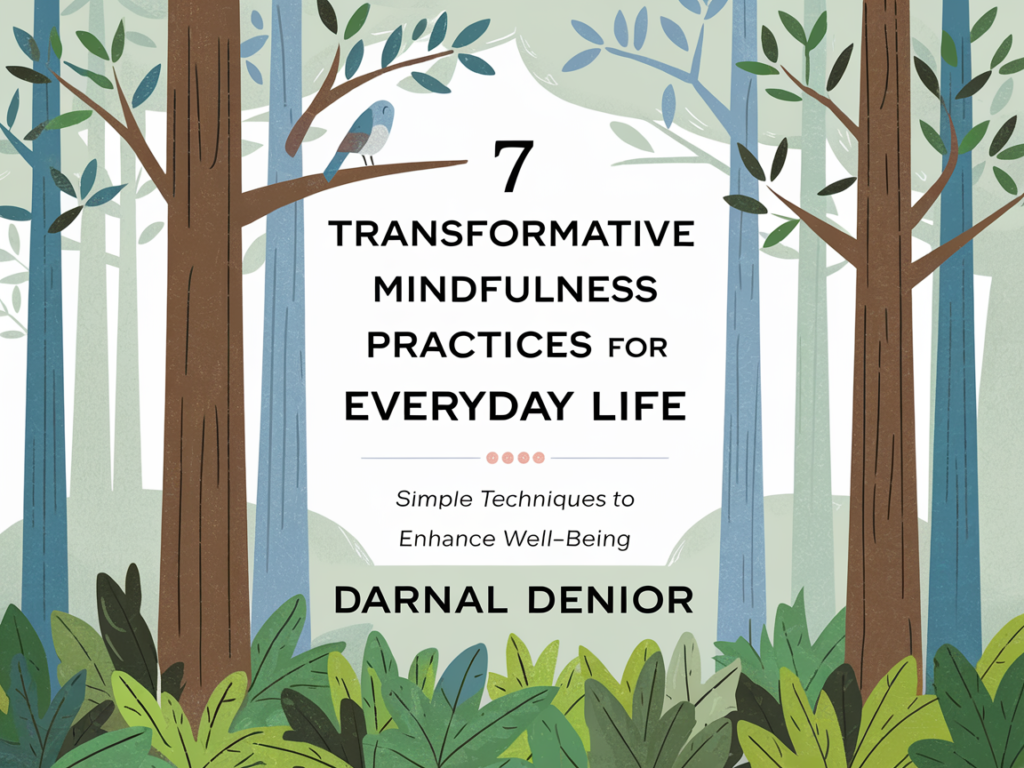Introduction
“In today’s fast-paced world, mindfulness has emerged as a vital tool for enhancing mental well-being and alleviating stress. Rooted in ancient meditation practices, mindfulness encourages individuals to cultivate awareness and acceptance of the present moment. This article delves into practical mindfulness techniques that can seamlessly integrate into your daily routine, empowering you to foster a calmer, more centered existence. Discover how these simple practices can transform your mental landscape and improve your overall quality of life.”
What is Mindfulness?
Mindfulness is the practice of paying deliberate attention to the present moment without judgment. It involves cultivating a heightened awareness of your thoughts, feelings, bodily sensations, and the environment around you. Rather than getting caught up in regrets about the past or anxieties about the future, mindfulness encourages individuals to immerse themselves fully in the here and now.
This practice fosters a non-reactive awareness, allowing you to observe your thoughts and emotions without immediately reacting to them. By simply acknowledging what you’re experiencing—whether it’s a fleeting thought, a sensation in your body, or a sound in your environment—you create a space for greater clarity and understanding.
Research has shown that engaging in mindfulness can significantly reduce stress, improve focus, and enhance overall emotional well-being. It empowers individuals to respond to challenges more effectively, promoting resilience and a sense of calm amidst life’s chaos. As you develop a mindfulness practice, you may find that your ability to navigate daily stresses improves, leading to a more balanced and fulfilling life.
Benefits of Mindfulness
- Reduces Stress: Regular mindfulness practice can decrease levels of the stress hormone cortisol, leading to a greater sense of calm.
- Enhances Focus: Mindfulness encourages better concentration and attention, making it easier to stay present in tasks.
- Improves Emotional Regulation: Practicing mindfulness can help you respond to situations with greater awareness and less emotional reactivity.
- Promotes Well-Being: Engaging in mindfulness has been linked to increased feelings of happiness and life satisfaction.
Mindfulness Practices for Everyday Life
- Mindful Breathing
- How to Do It: Take a few minutes to focus on your breath. Sit or lie comfortably, close your eyes, and inhale deeply through your nose, then exhale slowly through your mouth. Concentrate on the sensation of your breath entering and leaving your body.
- Tip: Whenever your mind wanders, gently redirect your focus back to your breath.
- Body Scan Meditation
- How to Do It: Lie down comfortably and bring your attention to each part of your body, starting from your toes and moving up to your head. Notice any sensations, tension, or discomfort without judgment.
- Tip: Spend about 30 seconds on each body part, acknowledging how it feels before moving on.
- Mindful Eating
- How to Do It: During meals, slow down and pay attention to the taste, texture, and aroma of your food. Chew slowly and savor each bite.
- Tip: Avoid distractions like TV or smartphones while eating to enhance your awareness of the meal.
- Walking Meditation
- How to Do It: While walking, focus on the sensation of your feet touching the ground and the movement of your body. Notice your surroundings—the sights, sounds, and smells.
- Tip: Choose a quiet place where you can walk slowly and mindfully.
- Mindful Journaling
- How to Do It: Set aside a few minutes each day to write down your thoughts and feelings. Focus on what you’re experiencing in the moment without self-criticism.
- Tip: Reflect on moments of gratitude or insights you’ve gained throughout the day.
- Five Senses Exercise
- How to Do It: Take a moment to engage your five senses. Identify five things you can see, four things you can touch, three things you can hear, two things you can smell, and one thing you can taste.
- Tip: This exercise can be particularly grounding during stressful moments.
- Mindful Listening
- How to Do It: During conversations, practice active listening by fully focusing on the speaker. Avoid planning your response while they are talking. Instead, listen with the intent to understand.
- Tip: Notice the speaker’s tone, body language, and emotions to enhance your connection.
- Daily Mindfulness Reminders
- How to Do It: Set reminders on your phone or post sticky notes around your living space to prompt you to pause and practice mindfulness throughout the day.
- Tip: Use phrases like “Breathe” or “Be present” to encourage mindfulness in everyday moments.
Conclusion
Incorporating mindfulness practices into your daily routine can lead to a more balanced, aware, and fulfilling life. By focusing on the present moment, you can cultivate resilience against stress and enhance your overall mental well-being. Start with small steps and gradually integrate these practices into your life, and you’ll likely find greater peace and clarity amid the chaos.
FAQs
1. What is mindfulness?
Mindfulness is the practice of being fully present in the moment, observing thoughts and feelings without judgment.
2. How can mindfulness help reduce stress?
Mindfulness helps reduce stress by encouraging awareness of thoughts and feelings, leading to better emotional regulation and decreased reactivity.
3. Do I need to meditate for long periods to benefit from mindfulness?
No, even a few minutes of mindfulness practice each day can have positive effects on mental well-being.
4. Can mindfulness be practiced anywhere?
Yes, mindfulness can be practiced anywhere—at home, work, or while commuting. Simple techniques like mindful breathing can be done in various settings.
5. How can I stay consistent with my mindfulness practice?
Set aside specific times for mindfulness in your daily routine, and consider using reminders or apps to keep you accountable.
Call to Action
“Ready to embrace a more mindful life? Start integrating these mindfulness practices into your daily routine today! Share your experiences in the comments below, and don’t forget to subscribe to our newsletter for more tips on enhancing your well-being. Together, let’s cultivate a healthier, happier you!”

